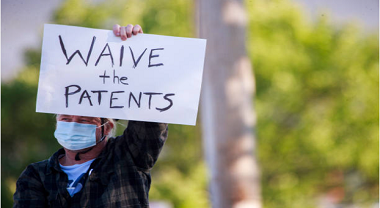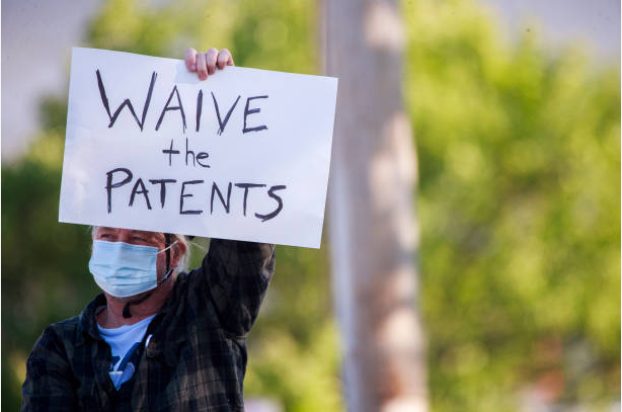An Outline on South Africa and India’s WTO IP waiver
An overview and the objective of the waiver
The onset of the COVID 19 pandemic has sparked discussions surrounding the role of IPR in impeding healthcare accessibility, especially in developing and underdeveloped countries. Several organizations have noted that the patenting of healthcare products and vaccines translates to a “red tape” that is uncalled for in such tumultuous times. Thus, the COVID 19 pandemic has underlined the importance of waiving patents and other IP-related rights linked to healthcare products, vaccines, and scientific processes to ensure the accessibility of the same on a global level. The WTO TRIPS waiver, which was initially proposed in October 2020 by South Africa and India, was a landmark response to the COVID 19 pandemic. South Africa and India jointly created the proposal in order to waive several sections of the TRIPS agreement, including the non-enforcement and granting of patents and other IP rights such as copyright and industrial designs pertaining to COVID-related medical products or technologies.
[Image Source:gettyimages]
Highlights of the WTO TRIPS waiver proposed by South Africa and India
Primarily, the proposal suggested a waiver from specific provisions of the TRIPS agreement for the prevention, containment, and treatment of COVID 19. The proposal first acknowledged that the pandemic represents a global emergency wherein all the WTO members must work unanimously to ensure that IPs such as patents, industrial designs, copyrights, and the protection of undisclosed information would not impede the timely access of affordable medical products and facilities including vaccines. It was also noted that the pandemic severely impacted developing and least developed countries due to acute shortages of medical facilities and products, which has negatively affected their response to the COVID 19 outbreak.
The proposal has recognized that the accelerated domestic production of medical products for treating the virus would be vital for effectively battling the pandemic. However, the proposal observes that Intellectual Property Rights (IPR) has managed to potentially hinder the timely provisioning of affordable medical products and facilities to COVID 19 patients. More specifically, patents have time and again acted as a hindrance when it comes to ensuring the equal distribution of medical products. Consequently, several WTO members have amended their national patent laws to expedite the process of issuing compulsory licensing. The proposal suggested that using flexibilities available in the TRIPS agreement may result in institutional or legal difficulties. More specifically, it was noted that the requirements enlisted under Article 31 would result in cumbersome processes for the import and export of pharmaceutical products that need to be carried out by developing and least developed countries. Finally, the proposal has requested the Council for TRIPS for a waiver from the implementation, application, and enforcement of Sections 1, 4, 5, and 7 of Part II of the TRIPS Agreement, which shall be continued until widespread vaccination is in place globally and the majority of the world’s population has developed immunity. Thus, if the waiver was to be granted, countries who are WTO members may choose to neither grant nor enforce patents and other IP-related rights linked to COVID 19 drugs, vaccines, technologies, and other medical products.
Outcomes of the subsequent meetings held after introducing the proposal
-
WTO Council meeting held in October 2020
The waiver was proposed and discussed through a WTO TRIPS Council meeting which was held on the 15th-16th October. Upon introducing the proposal, countries such as Kenya and Eswatini joined South Africa and India as the official cosponsors of the proposal. Subsequently, over 100 countries pledged their support for the waiver. However, nine countries (Australia, Brazil, Canada, EU, Japan, Norway, Switzerland, United Kingdom, and the United States) opposed the proposal. Countries such as Chile, China, Colombia, Jamaica, and El Salvador welcomed and supported the need for further discussions of the proposal. Thus, it was observed that countries belonging to the LDC group (Least Developed Countries) and developing countries welcomed the proposal while developed countries opposed it.
-
WTO Council meeting held in November-December 2020
Subsequent informal meetings were held on the 20th of November and the 3rd of December to further discuss the waiver’s repercussions. During these informal meetings, WTO members brainstormed their views on the waiver while seeking clarification on its functioning and impact. However, WTO members could not reach a consensus. Members who supported the waiver argued that IP protection impedes accessible healthcare systems, which may severely impact developing countries and LDCs. On the other hand, developed countries such as the UK and the US argued that there exists no definite evidence which suggests that IP rights may impede or restrict the timely procurement of COVID 19 related medical products. Upon discussing the consequences of enforcing IP protection on COVID-related medical products, the informal meeting was dismissed, and a formal meeting was scheduled for 10-11th March 2021.
-
WTO Council meeting held on the 10-11th March
During the WTO Council meeting held in March, all the members acknowledged their common goal: to provide timely and secure access to affordable medicines and vaccines for all. However, the members did not reach a consensus with respect to the role of IP in impeding access to quality healthcare. The WTO members encouraged discussions based on concrete evidence which has proven that IP enforcement may play a role in retarding the accessibility of vaccines and medicines. The outgoing chair of the TRIPS Council, Ambassador Xolelwa Mlumbi, suggested that the members must shift to a solution-oriented discussion.
-
TRIPS Council meeting, which was held on 20th July 2021
Several informal open-ended meetings were held from 17th and 30th June and on 6th to 14th July. All the WTO members unanimously agreed on the importance of a text-based approach to address the proposal. The chair of the TRIPS Council, Ambassador Dagfinn Sorli of Norway, reported that the discussions focused on the scope, duration, and implementation of IP rights regarding the waiver. Discussions also focused on the management of confidential data that would be disclosed during the waiver period. Lastly, the chair announced his intention to invite the delegates for an open-ended informal meeting of the TRIPS Council in early September 2021, and a formal meeting was scheduled for 13-14 October.
Several international groups have time and again expressed and publicized their support for the waiver. This has pushed developed countries such as Australia and the USA to support the waiver proposal. While the waiver proposal aims to negotiate technology transfer and revoke IP enforcement on COVID medical products and vaccines, experts have debated the efficacy and importance of the waiver. The waiver proposal, which is under discussion by WTO delegates, may provide relaxation to a certain level with respect to the cost-efficiency and accessibility of healthcare and medicinal facilities. However, the setting up of manufacturing facilities for medicinal items may impact LDCs and developing countries. Nevertheless, the TRIPS waiver may pose as a plausible solution to effectively battle the ongoing pandemic to a great extent.
Author: Sanjana, a BBA LLB student of Symbiosis Law School (Hyderabad), in case of any queries please contact/write back to IP And Legal Filings at support@ipandlegalfilings.com.



